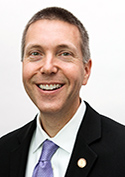
John S. Steinberg, DPM, FACFAS
ACFAS President
"If you want to go FAST, go alone. If you want to go FAR, go with others..."
We are all familiar with the importance of relationships in our professional life. Most of us depend on personal connections for referrals, business opportunities and professional relationships that can make or break our practice success. It may be cliché, but the world provides constant reminders that it is often “not what you know, but who you know.” I would like to share some insight into the relationships that YOUR ACFAS depends on to maximize the benefits of your membership dues and to leverage the collective betterment of this specialty.
ACFAS Board of Directors
We are fortunate to have a collaborative 11-member board, which oversees all our programs, services, policies and governance via our Strategic Compass. Given the size of our profession, many of the board members know each other from prior work, and new directors quickly gain comfort with the governance and leadership machinery. The Executive Committee members have worked together for years prior to these roles and provide an appropriate sense of continuity and oversight to the board’s work product.
ACFAS Staff
We are a relatively small association with just 14 full-time staff employees. The years of seniority and strong sense of dedication from our staff has impressed me from the start. Chris Mahaffey took over the reins of Executive Director leadership at ACFAS in 2003 and has been a consistent and balanced chief executive. Senior staff attend board and committee meetings to provide specialized expertise and institutional memory. Our staff builds strong relationships with their respective committees and chairpersons to facilitate timely and effective completion of their goals.
AANP, AADE and AAFP
In a purposeful initiative to construct collaboration between members of ACFAS and members of other related health associations, we have paved new roads to several associations. We have built relationships with the American Association of Nurse Practitioners (AANP), the American Association of Diabetes Educators (AADE) and the American Academy of Family Physicians (AAFP). We have exchanged speakers and will soon co-publish a joint clinical consensus statement on gout in JFAS and the Journal of Nurse Practitioners.
APMA
Gone are the days of isolationism between ACFAS and American Podiatric Medical Association (APMA). I am proud to report that both leaderships now have regular communication and have found several areas of mutually beneficial collaboration. Per our ACFAS bylaws, there is no obligation of APMA membership, but the reality is most of us are members of both organizations. We have no intent of returning to a formal “affiliate” status with any organization, but we do have strong intent to work together with others for a stronger profession.
AOFAS and AAOS
Perhaps the most substantial achievement of our collaboration with APMA was the joint task force, which led to a meeting between ACFAS, APMA, the American Orthopaedic Foot and Ankle Society (AOFAS) and the American Academy of Orthopaedic Surgeons (AAOS). This landmark face-to-face meeting of leaders and staff included a wide agenda of future collaboration opportunities and a framework to explore comparability between our specialties. The meeting provided a great foundation for us to formally collaborate. A subsequent conference call took place, and a second face-to-face meeting is planned. Additionally, our staffs have been interacting regularly, and I am optimistic about the opportunities this new relationship can provide.
Industry
This is an important and sometimes challenging dance. Our industry partners and meeting supporters are crucial to our ability to offer educational programming to our members. However, ACFAS takes conflict of interest very seriously and does not allow inappropriate influence from industry or other organizations. In 2015, the ACFAS Board adopted most of the Council f Medical Specialty Societies’ “Code for Interaction with Companies,” which clearly delineates how the College ethically interacts with industry. In an era where many associations and CME organizers allow industry to “buy the podium,” the College has gone the other direction has taken added steps to ensure our educational content is presented in an unbiased manner.
I hope this information is a helpful insight into YOUR ACFAS. The Board and I want to make sure you have access to the work we are doing to advance this profession and College. Please send any questions or comments to me at president@acfas.org.
